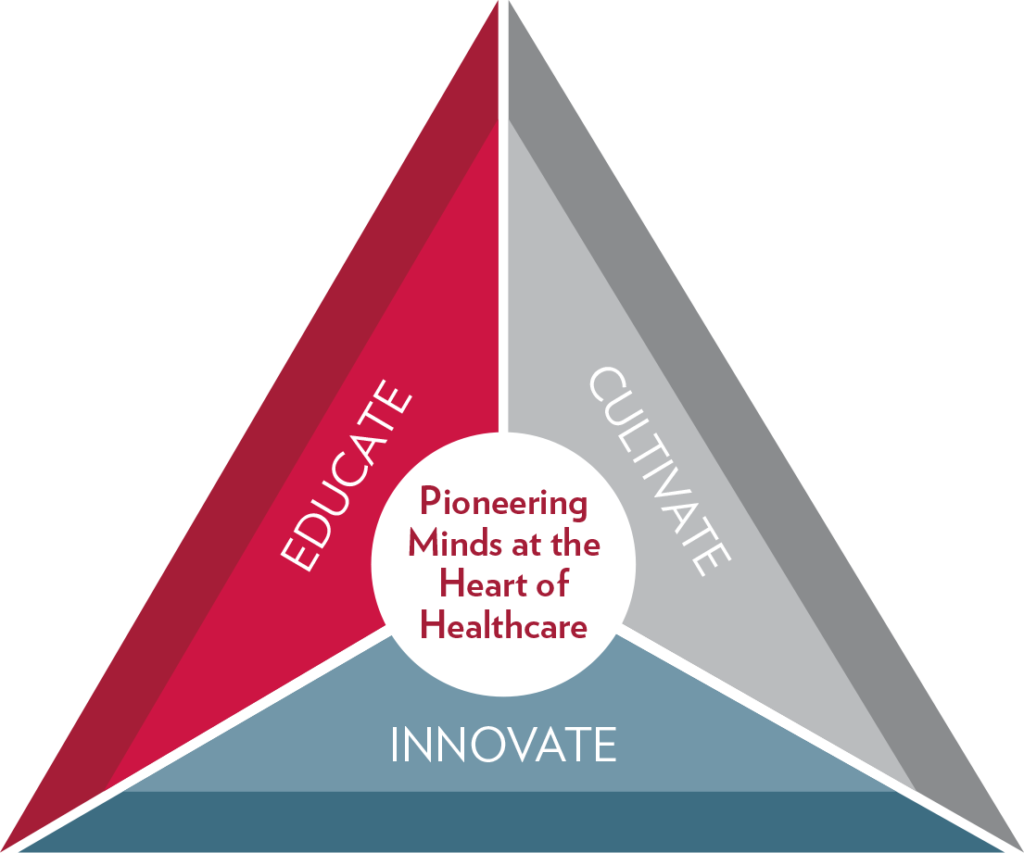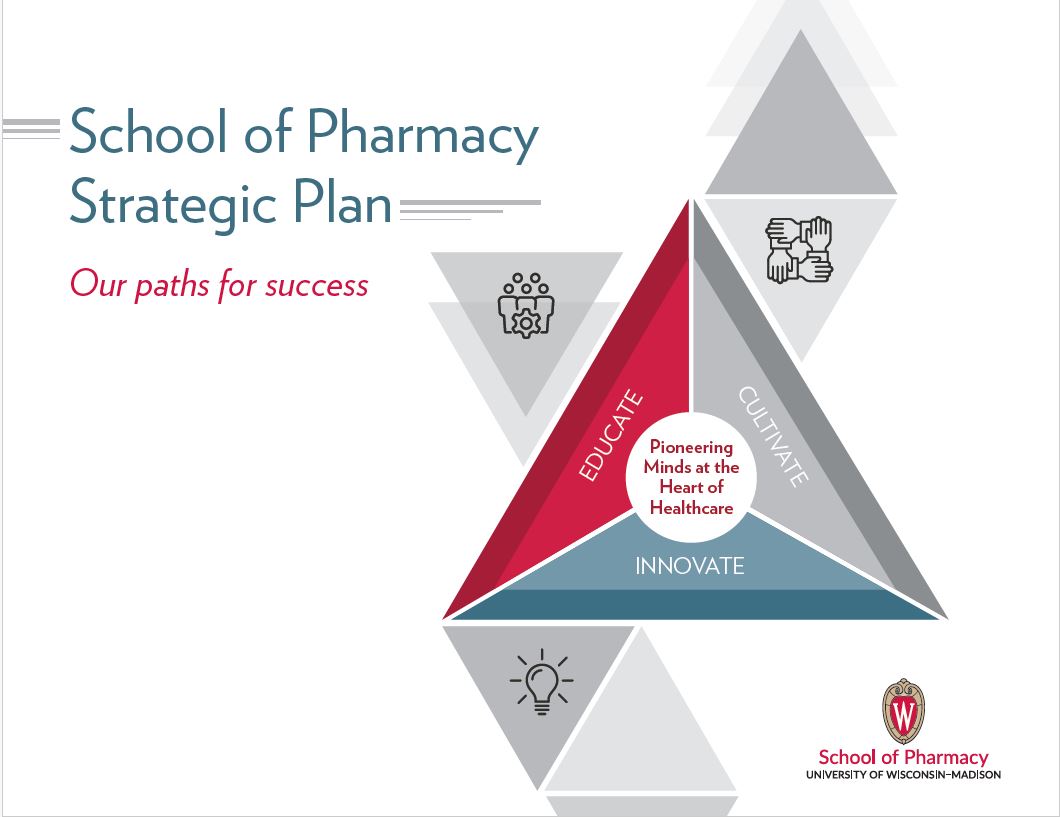Vision, Mission, Values, and Strategic Plan for the School of Pharmacy
Our Vision
The University of Wisconsin–Madison School of Pharmacy will be internationally preeminent in research, education, outreach, and practice, and train the next generation of pharmacists, scientists, and educators in an inclusive, collaborative, and welcoming environment.
Our Mission
The mission of the University of Wisconsin–Madison School of Pharmacy is to educate, train, and promote life-long learning opportunities for students, pharmacists, and scientists, while creating, disseminating, and applying new knowledge based on research and practice in the biomedical, pharmaceutical, social, and clinical sciences to improve health and health equity.
Our Values
- Community: We cultivate spaces in which everyone can be heard and supported. We take responsibility for mistakes, give credit to others, and work to achieve a good outcome for all. We are patient and forgiving while persistent in our endeavors.
- Integrity: We communicate with transparency and respect. We welcome and provide feedback. We keep the promises we make to ourselves and each other. We model ethical decision-making in scholarship, practice, and teaching.
- Compassion: We allow for the opportunity for everyone to flourish. We care about the emotional, physical, and psychological well-being of everyone. We create space for all voices by appreciating others’ perspectives or situations when they are different from our own.
- Excellence: We innovate by implementing new ideas and practices to meet the evolving and changing needs of our stakeholders. We are committed to ongoing improvement to ensure we are meeting our goals and standards. We are willing to step outside our comfort zone, fail, and learn.
About
Our Strategic Plan
Pioneering minds at the heart of healthcare
INNOVATE
Position the School to drive advancements in knowledge and innovation that improve health and health equity.
- Increase the scale and scope of our resources to support research and education initiatives.
- Develop a system to continuously identify investigator research needs, including space, staff, and infrastructure, by 2023.
- Develop a system that identifies and builds teams with the potential for project and program grants from federal granting agencies (ongoing).
- Develop a centralized mechanism that identifies and tracks all research-related activities, including changes in resources, by 2023.
- Expand revenue-generating initiatives, including online courses, online certificates, online professional masters’ degrees, summer courses, and activity-based revenue by 2024.
- Invest in interdisciplinary and translational research by 2026.
- Each division will champion at least two projects that incorporate interdisciplinary partnerships by 2023.
- Create new, and enhance existing, partnerships to better link the School of Pharmacy with local and regional partners by 2025.
- Develop strategies to position the School of Pharmacy to participate in the activities of the Center for Human Genomics and Precision Medicine and the Center for Health Disparities Research (ongoing).
EDUCATE
Empower students and stakeholders to be change agents that meet society’s evolving health needs.
- All PharmD students will be prepared to serve medically underserved populations by 2026.
- Survey the PharmD curriculum and identify elements that prepare our students to serve marginalized populations by 2022.
- As part of their professional development, all PharmD students will be engaged to health care issues specific to medically underserved populations by 2023.
- Require every PharmD student to have an experiential education rotation working with medically underserved populations by 2026.
- Continuously evaluate the academic experience to ensure students are fully prepared to excel after graduation.
- Survey and update the PharmD curriculum to incorporate the teaching and practice of personalized pharmacy by 2022.
- Provide opportunities, within and outside the curriculum, for all students to develop personal and transferable skills such as leadership, communication, and problem-solving to succeed in the workplace by 2025.
- Increase by 50% the number of opportunities for research for PharmD and PharmTox students by 2023.
- Create scholarships for professional and undergraduate students to participate in summer research (ongoing).
- Develop new and innovative courses and fields of study to ensure that our portfolio reflects advances in knowledge and meets the changing needs of students and society (ongoing).
- Ensure that teaching and assessment at the School of Pharmacy provide an equal opportunity for all students to achieve and demonstrate their full academic potential.
- Develop methods to reduce gaps in achievement and encourage greater diversity in assessment to ensure an equal opportunity for all students to achieve and demonstrate their full academic potential by 2025.
- Develop a continuous improvement process that ensures and supports innovation and excellence in teaching by establishing ways of highlighting this in our faculty and staff recognition and reward processes by 2023.
CULTIVATE
Foster an inclusive community focused on inquiry, respect, diversity, and dedication to talent development.
- Continuously work, with utmost priority, towards increasing the diversity of the faculty, staff, and student profiles.
- Evaluate and improve our recruitment, onboarding, retention, and mentoring policies and procedures for faculty and staff by 2023.
- Evaluate and improve our recruitment, retention, and mentoring strategies for students by 2023.
- Create programs and develop sustainable infrastructure to improve the climate for underrepresented faculty, staff, and students, including the identification of barriers to success, by 2023.
- Create a permanent pool of funds to increase the number of scholarship offerings, especially for underrepresented students, by 25% by 2026.
- Create partnerships with UW–Madison schools and colleges to increase by 25% the number of applications (PharmD, PharmTox) from UW–Madison students by 2026.
- Develop a system that provides dedicated personal development support for faculty and staff by 2025.
- Develop a training and evaluation system to ensure that those with supervisory and leadership responsibilities are effective in those roles by 2025.
- Increase by 25% the number of faculty and staff attending professional development opportunities by supporting attendance/hosting such training opportunities by 2026.
- Develop a coordinated mechanism that informs faculty and staff of relevant, high-quality training opportunities via a regularly updated list by 2023.
- Create a pool of staff professional development funding by 2025.
- All faculty, staff, and students will demonstrate a growth mindset that promotes inclusion and well-being.
- Develop and integrate policies and practices to sustainably enhance and embed inclusive excellence at all school levels by 2023.
- Units and committees will create or enhance processes that promote a culture of continuous improvement by 2024.
- Develop a mechanism to assess well-being among faculty, staff, and students by 2023.
* Medically Underserved Populations: The U.S. Department of Health and Human Services define medically underserved populations to include the following groups: 1) racial and ethnic minorities; 2) people with physical disabilities; 3) low income; or 4) live in rural area per census data. See Serving Vulnerable and Underserved Populations.

